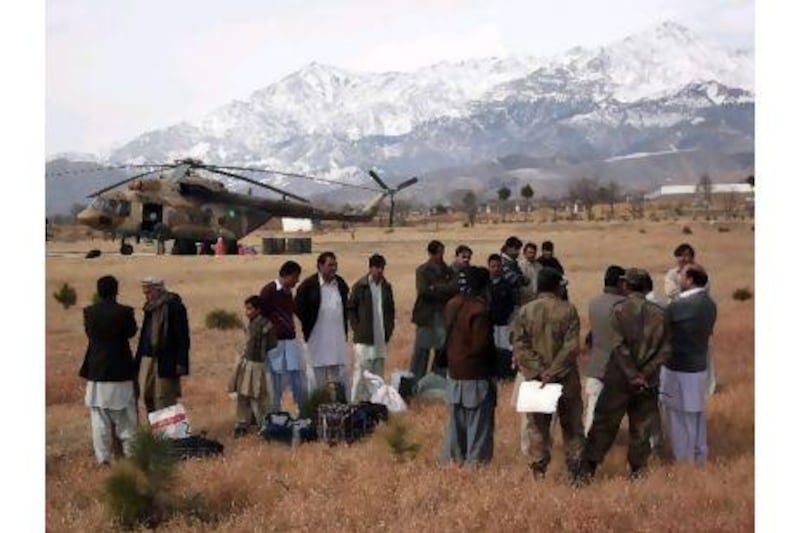ISLAMABAD // Tribesmen in a Pakistani region wracked by sectarian violence fuelled by al Qa'eda have agreed to end a four-year blood feud, politicians said.
More than 3,000 people have died in the Kurram area since 2007, after an influx of militants from nearby tribal regions sparked fighting between Shiite and Sunni tribes.
Kurram is one of seven tribal regions of Pakistan bordering eastern Afghanistan, known collectively as the Fata.
Pakistani politicians involved in talks by a 100-member "grand jirga", or council of elders, drawn equally from the rival tribes and their allies, said the agreement was reached in Parachinar on Monday.
"The people of Kurram have been waiting for the restoration of peace for years, and would soon live like brothers again," Malik Waris Khan Afridi, a former minister, told reporters in the region's capital, Parachinar.
The conflict started in 2006 when militants arriving from other tribal areas carried out attacks on Shiites. The situation deteriorated in 2007, when Sunnis blocked a key road in Kurram and Shiites expelled Sunnis from Parachinar.
The peace agreement came amid reports by the Pakistani media that the Haqqani Network, a potent Afghan militant faction based in North Waziristan, had brokered the deal in return for a new safe haven and right of passage into Afghanistan.
The politicians dismissed the reports as "propaganda".
"There is nothing like that. More than 1,200 of our [Shiite] people have been martyred. It is out of the question that we would allow a single Talib any access," Sajid Hussain Turi, who represents Kurram in Pakistan's parliament, told The National.
The politicians said the terms of the agreement would be made public "within days".
Reports in the US and Pakistani media had claimed that the Haqqani Network had become involved in the negotiations in September.
They said Ibrahim and Khalil Haqqani, sons of the network's ailing leader, Jalal-ud-Din Haqqani, had participated in two rounds of talks in September, held in Peshawar.
They also participated at a 10-day session of the 100-member tribal council in Islamabad in December, the reports had said.
The Fata Research Centre, an independent think tank based in Islamabad, said reports of the Haqqanis' involvement had been privately confirmed by members of the tribal council.
It said a scheduled December 25 meeting of the grand jirga, which had been expected to prove decisive, had not materialised because Khalil Haqqani was supposedly not available.
Jirga members were informed that Mr Haqqani was spending Christmas in London, it said.
The militant brothers hosted a delegation of Pakistani politicians, led by Malik Waris Khan Afridi, a former minister, in Miranshah, the capital of North Waziristan, on January 3, it said.
The Haqqani Network's bases in North Waziristan, from where it launches attacks against Afghan and US-led Nato forces, are a bone of contention between Pakistan and the United States.
Barack Obama, the US president, in an October report to the Congress, described North Waziristan as the global "epicentre of terrorism".
Washington frequently pressures Islamabad to launch a military operation against the militants there.
The Pakistani government has promised action, but has refused to commit on the timing, saying its military can't launch a new campaign while it is conducting counterterrorist actions in other parts of the Fata and Khyber-Pakhtunkhwa.
It has also been reluctant to act against the Haqqani Network because of a strategic relationship that dates back to the Soviet occupation of Afghanistan in the 1980s, analysts said.
In return for being permitted to operate freely in the Fata, the network has occasionally acted as an arbitrator between Pakistani militants and the government, they said.
According to Pakistani media reports, the Haqqani Network's commander in North Waziristan, Hafiz Gul Bahadur, has played peacemaker after recent clashes between militant groups and security forces.
Pakistan intelligence sources have said limited, targeted, military operations in North Waziristan are likely by the summer.
That has prompted the Haqqani Network to look for an alternative safe haven in the Fata, the analysts said.
They said Kurram was the network's preferred destination, because it offered the opportunity to spread its operations in Afghanistan northwards to the province of Nangarhar.
"The Bodki-Kharlachi [border] crossing is what the Haqqanis want. If they get it, that would be a great success, because it would put them within 60km of Kabul," said Ashraf Ali, president of the Fata Research Centre.
However, he agreed any such arrangement would not be possible unless the predominantly Shiite Bangash and Turi tribes residing in border areas agreed.
Mr Turi, the parliamentary representative for Kurram, said the success of the agreement, which restates the terms of a 2008 deal, depended on the support of the government and military.
A key expectation of the Shiite tribes is the reopening of the Parachinar-Thall road, the region's only paved link to the Pakistani hinterland, he said. The road has been blockaded since 2007 by Sunni tribesman, allied with militants.
The alliance has been broken by the progress in negotiations, sparking clashes that have killed more than 100 militants, including two prominent commanders.
Mr Turi said the opening of the road would allow the fulfilment of the Shiite tribes' other major condition - the safe return of tens of thousands of people displaced by the violence in Kurram.





